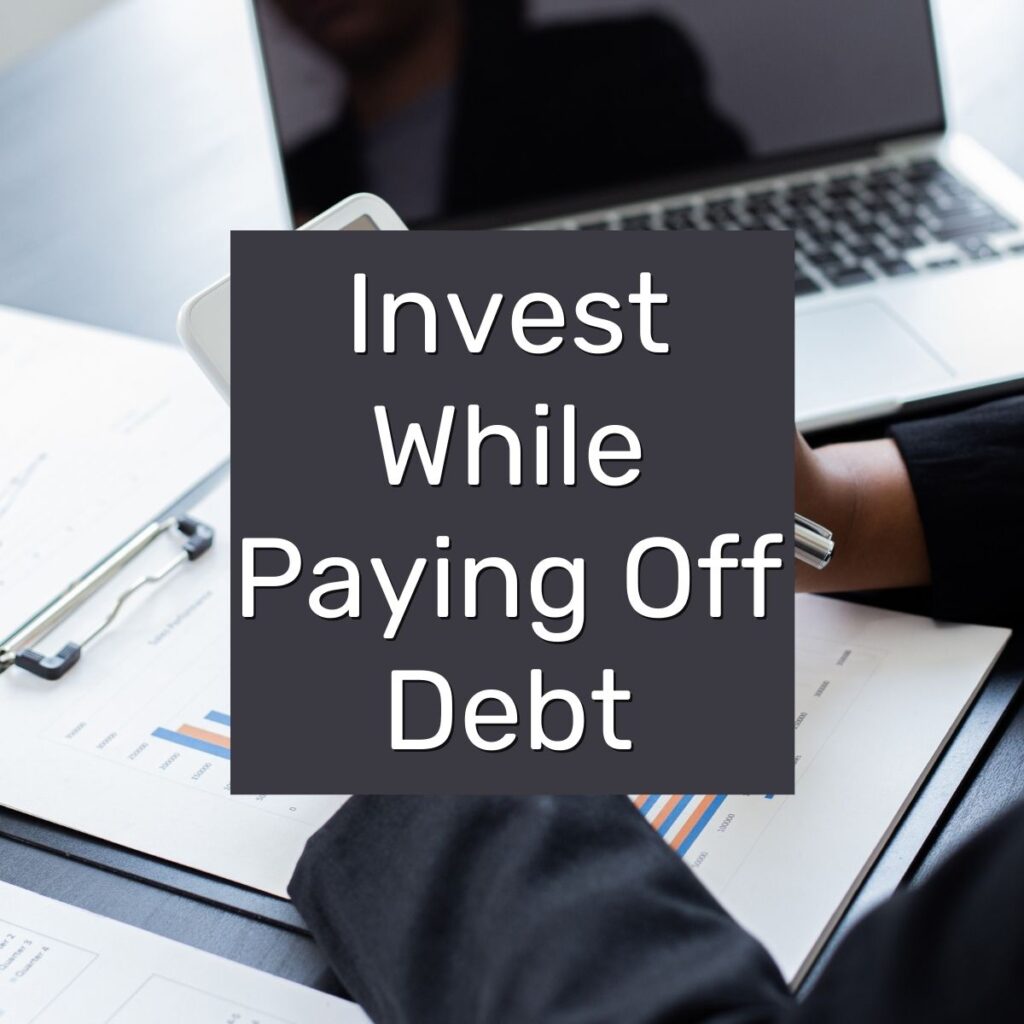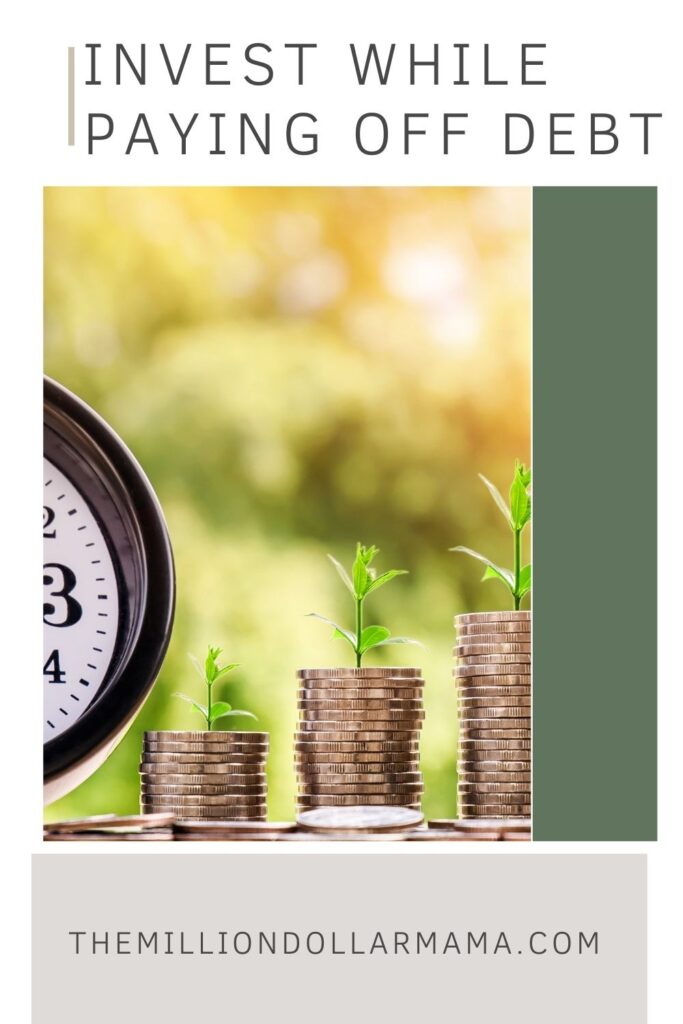This is a guest post by Marcel Bluvstein, the President and Co-Founder of United Settlement. Marcel has a passion for investing and is also involved in many real estate endeavors.
Are you focused on paying off debt, but want to start investing as well? You might wonder if it’s better to simply pay off your debt now and start investing once your debt is gone.
However, the earlier you start, the more benefits of investing you’ll see in the future. Learn how to invest while paying off debt with these seven debt payoff and investment tips.

Set Realistic Money Goals
It’s important to be realistic any time you look at your finances or set money goals. Being too optimistic about your ability to repay debt or set aside money for investing will lead to frustration when you can’t meet your goals.
This frustration could cause you to stop working toward your goals at all, which certainly won’t help your finances in the long run.
Instead of thinking only of large money goals, start small and set realistic short-term goals. For example, instead of trying to save $5,000 in a year, focus on saving $500 in six months.
You’ll feel empowered when you reach this goal and can set your next six-month goal a little higher.

Create a Budget
Budgets can be intimidating to a lot of people. While they sound scary, budgets are really just a roadmap of where you plan to put your money each month. Creating a budget is simpler than you might realize if you follow these steps:
- Add up all of your monthly income.
- Add up all of your monthly expenses. You can use the six-month average of your fluctuating expenses to get a better idea of what to budget. For example, your grocery and fuel spending changes each month, so you can use your average spending for budgeting.
- Subtract your expenses from your income. You should end up with extra money left over. If not, you’ll need to rework your expenses to find places to cut spending.
- Allocate the money that’s leftover to savings, investments, or extra debt payments.
Your budget isn’t set in stone. You can rework and tweak it until it works for your lifestyle, income, and spending habits.
If you use a budget for a few months and realize you’re spending more in a category than you thought, go back to your budget and change things around to fit your current situation.

Use Debt Payoff Strategies for High-Interest Debt
High-interest debt shouldn’t be ignored when you’re trying to pay off debt and invest at the same time. Making only the minimum payment on credit cards and other high-interest debts can make those debts cost much more than they did originally.
If you have high-interest debt, focus on paying it off more aggressively than paying other debts or investing.
One method for high-interest debt payoff is the debt avalanche method. To use the avalanche method, continue paying the minimum payment on all of your debts to avoid missed payments.
With extra funds from your budget, you’ll pay down the debt with the highest interest rate first. When that debt is paid off, you’ll focus on the debt with the next highest interest rate.
Save for Emergencies First
Although investing your money in stocks, mutual funds, or even real estate can pay off big in the long run, you should always have an emergency fund first. An emergency fund is a savings account where cash can be accessed easily to pay for an unexpected expense, such as a sudden car repair or medical bill.
Emergency funds are a great line of defense against taking on more debt in the future. Before you start aggressively investing, make sure you have at least three to six months’ worth of savings available for unforeseen costs.

Start Investing as Soon as Possible
Just because you need to pay off high-interest debt and save for emergencies doesn’t mean you can’t also invest your money. It may seem silly to only invest a small amount each month.
However, the sooner you get started — even if it’s small — the more time your money has to grow. It also gives you more time to ride out the highs and lows of the stock market or other investments.
Look for Smart Investment Opportunities
Investing isn’t just putting money into a single stock on the stock market. In fact, many savvy investors don’t invest much in single stocks at all.
Other investment vehicles — like mutual funds, exchange-traded funds (ETFs), and real estate investment trusts (REITs) — act like regular stocks but offer the chance to diversify your portfolio and spread the risk out.
Different types of investment accounts can also help you make smart investment decisions. Does your job offer a 401(k) retirement plan and company match?
If so, your company will match the contributions you make into your account (up to a certain amount) each year. That’s essentially free money for your retirement savings.
An Individual Retirement Account, or IRA, can also be a smart place to invest money while you pay off debt. IRAs are tax-advantaged depending on the type of IRA you choose, so you’ll likely save money on taxes either now when you contribute or in retirement when you take the money out. Be sure to talk with a trusted tax advisor for advice related to your specific situation.

Automate Payments and Savings
Manually moving money, making debt payments, and contributing to investment accounts isn’t just confusing — it could hurt your investment and debt payoff efforts.
You might make a mistake and accidentally invest more than you intended or miss a payment. Or, you could fall into a trap of overspending and use money meant for saving and investing on consumable goods.
The easiest way to avoid missing payments, making mistakes, and spending your savings? Simply automate your money movements.
One of the greatest advantages of modern technology is money management tools like automatic payments and transfers. Most banks, investing platforms, and creditors let you automate transactions, so you can set them and forget them.
Bottom Line: Investing While Paying Off Debt
Whether you’re dealing with a small amount of debt or feel like you’re drowning in monthly payments, setting some money to invest can help your financial future.
As long as you can still make progress on your debt, you can get started investing on a low income. All of the money you put into investment accounts now has more time to grow and help you avoid future debt for long-term financial success.
What has been your method of paying of debt? Are you able to invest while paying off debt? Comment below and let us know!
Marcel Bluvstein, President & Co-Founder of United Settlement
Marcel graduated Touro College with a BS in Business Finance & Marketing and continued his education at Harvard University, studying Strategic Management for Growth Companies. Marcel worked at Rodman & Renshaw a full-service investment bank before starting his entrepreneurial carrier with Elite Restaurant Equipment, an online restaurant equipment store which grew to over 100,000 active customers. Mr. Bluvstein is also involved in Real Estate activities such as: Commercial Warehouses, Multi-family rental properties, and condos in New York City and Newark, New Jersey. Other assets in his portfolio include stocks/securities, crypto currency, and more. Marcel’s passion for investing is only matched with his passion to give back to his community.
Hi I’m Ana. I’m all about trying to live the best life you can. This blog is all about working to become physically healthy, mentally healthy and financially free! There lots of DIY tips, personal finance tips and just general tips on how to live the best life.


Leave a Reply